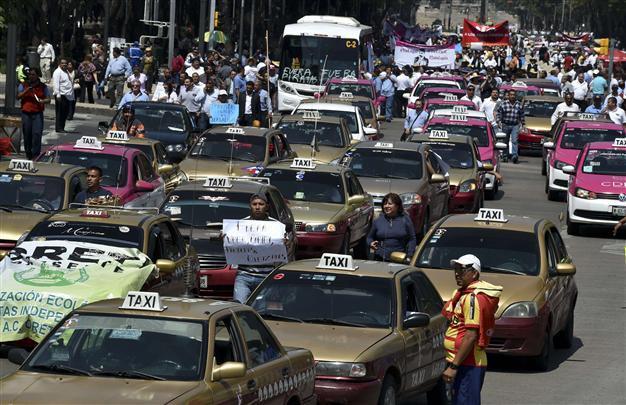Mexico City unveils first regulation on Uber in Latin America
MEXICO CITY - Reuters

Taxi drivers take part in a protest against the private taxi company Uber for alleged unfair competition, in Mexico City on May 25, 2015. AFP Photo
Mexico City became the first city in Latin America to regulate Uber on July 15, announcing rules that include a 1.5 percent ride levy, a yearly permit fee and a minimum vehicle value.
The city government said vehicles used by Uber and other services such as Cabify would have to cost at least 200,000 pesos ($12,674). That was 50,000 pesos less than in draft regulation seen by Reuters last week, but more than the company had hoped. Each Uber vehicle will also need a 1,599 peso yearly permit that will be paid by the driver.
Nevertheless, the rules did not impose a limit to the number of vehicles Uber could deploy around the city, which Mexico City had threatened to do in its preliminary proposals.
Uber said the 200,000 peso minimum value was “a high bar” but “doable.” Before the regulation was published, the firm said the price had “no logical benefit” to the city.
The minimum start-up cost for drivers to use its most popular service was around 150,000 pesos including the cost of a car, but most cars are valued at more than 200,000 pesos when other features are included, Uber spokeswoman Ana Paula Blanco said.
The company was relieved that a previous plan to enforce a minimum car age of five years had been removed.
Last week Uber’s public policy director Corey Owens said the 1.5 percent ride levy is at the “high end” of what it pays in other cities, such as a 1 percent charge in Washington D.C. That cost cannot be passed on to passengers or drivers but will be paid by the company, a government spokesman said.
The controversial ride-hailing service, which has been valued at over $40 billion, has come under increasing pressure from regulators in recent months in various parts of the world.
Taxi drivers in Mexico City were angry the rules were not tougher. They will protest the move and could go on strike, said Ruben Alcantara, a union leader, who criticized the government for a “lack of respect” towards taxis.
“We didn’t expect the city’s government to react so violently towards us,” he said.
Uber opened in Mexico City in 2013. Uber says the metropolis is one of its fastest-growing markets globally with 500,000 customers and over 10,000 drivers, some of whom share cars.
Mexico City was the largest city in the world to regulate ride-hailing apps, Uber said. The city has 140,000 registered taxis and Uber’s main competitor Cabify, which welcomed the regulation, says it has 300,000 users.
